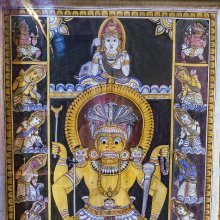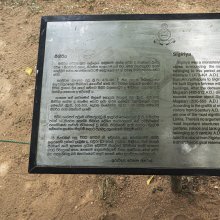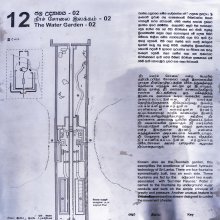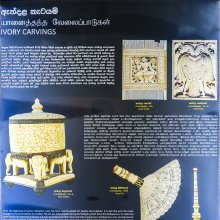Tiya, Tīya: 5 definitions
Introduction:
Tiya means something in Hinduism, Sanskrit, Jainism, Prakrit, Tamil. If you want to know the exact meaning, history, etymology or English translation of this term then check out the descriptions on this page. Add your comment or reference to a book if you want to contribute to this summary article.
Images (photo gallery)
(+1 more images available)
In Hinduism
Vyakarana (Sanskrit grammar)
Source: Wikisource: A dictionary of Sanskrit grammarTīya (तीय).—tad. affix तीय (tīya) in the sense of पूरण (pūraṇa) added to the words द्वि (dvi) and त्रि (tri) before which त्रि (tri) is changed into तृ (tṛ). e, g. द्वितीयः, तृतीयः (dvitīyaḥ, tṛtīyaḥ) cf. P. V. 2.54, 55; the tad. affix अन् (an) (अ) is added to the words ending in तीय (tīya) to mean a section e. g. द्वितीयो भागः (dvitīyo bhāgaḥ) cf. Kas. on P. V. 3.48.

Vyakarana (व्याकरण, vyākaraṇa) refers to Sanskrit grammar and represents one of the six additional sciences (vedanga) to be studied along with the Vedas. Vyakarana concerns itself with the rules of Sanskrit grammar and linguistic analysis in order to establish the correct context of words and sentences.
Languages of India and abroad
Prakrit-English dictionary
Source: DDSA: Paia-sadda-mahannavo; a comprehensive Prakrit Hindi dictionary1) Tiyā (तिया) in the Prakrit language is related to the Sanskrit word: Strikā.
2) Tīya (तीय) also relates to the Sanskrit word: Taita.
Prakrit is an ancient language closely associated with both Pali and Sanskrit. Jain literature is often composed in this language or sub-dialects, such as the Agamas and their commentaries which are written in Ardhamagadhi and Maharashtri Prakrit. The earliest extant texts can be dated to as early as the 4th century BCE although core portions might be older.
Kannada-English dictionary
Source: Alar: Kannada-English corpusṬīya (ಟೀಯ):—[noun] = ಟೀವ [tiva].
--- OR ---
Tīya (ತೀಯ):—[noun] a desire, longing (esp. for sexual union) that cannot be suppressed.
Kannada is a Dravidian language (as opposed to the Indo-European language family) mainly spoken in the southwestern region of India.
Tamil dictionary
Source: DDSA: University of Madras: Tamil LexiconTīya (தீய) adjectival < தீமை. [thimai.]
1. Evil, wicked, sinful; தீமையான. [thimaiyana.]
2. Fallacious; போலியான. தீயபக்கமுந் தீயவேதுவும் [poliyana. thiyapakkamun thiyavethuvum] (மணிமேகலை [manimegalai] 29, 143).
Tamil is an ancient language of India from the Dravidian family spoken by roughly 250 million people mainly in southern India and Sri Lanka.
Nepali dictionary
Source: unoes: Nepali-English DictionaryTiyā (तिया):—n. turn of number three in gambling;
Nepali is the primary language of the Nepalese people counting almost 20 million native speakers. The country of Nepal is situated in the Himalaya mountain range to the north of India.
See also (Relevant definitions)
Starts with (+28): Tiya-etuttukattu, Tiyacam, Tiyacamancal, Tiyacayam, Tiyacciyam, Tiyacey, Tiyaggala, Tiyaka-mavinotan, Tiyakam, Tiyakamuracu, Tiyakamuttirai, Tiyakappallu, Tiyakar, Tiyakaracar, Tiyakarti, Tiyaki, Tiyakkanni, Tiyakkati, Tiyakkirai, Tiyakkonatai.
Ends with (+683): Abhijatiya, Abhimamtiya, Abhishtatritiya, Abhitashtiya, Acala Cetiya, Achintiya, Acintiya, Acuva-tattia, Acyudantiya, Acyutadantiya, Acyutantiya, Adasetiya, Addakamtiya, Addhatiya, Adhatiya, Adhicchattiya, Adutiya, Advitiya, Agastiya, Aggalavacetiya.
Full-text (+79): Diya, Dhiya, Tritiya, Dvitiya, Manda theeya, Sajati, Heen-diya-siyambala, Ya 'diya, Jyamiti, Addhateyya, Che'diya, Anivartya, Thiya-kandha, Anivartiya, Tiyam, Dhik, Diya-damba, Maha diya siyambala, Strika, Jaymiti.
Relevant text
Search found 16 books and stories containing Tiya, Tīya, Tiyā, Ṭīya, Thiya, Theeya, Diya, Dhiya; (plurals include: Tiyas, Tīyas, Tiyās, Ṭīyas, Thiyas, Theeyas, Diyas, Dhiyas). You can also click to the full overview containing English textual excerpts. Below are direct links for the most relevant articles:
Rig Veda (translation and commentary) (by H. H. Wilson)
Chaitanya Bhagavata (by Bhumipati Dāsa)
Verse 1.7.157 < [Chapter 7 - Śrī Viśvarūpa Takes Sannyāsa]
Tiruvaymoli (Thiruvaimozhi): English translation (by S. Satyamurthi Ayyangar)
Pasuram 1.6.10 < [Section 6 - Sixth Tiruvaymoli (Parivatu il icanai)]
Pasuram 1.5.9 < [Section 5 - Fifth Tiruvaymoli (Vala el ulakil mutalaya)]
Lord Jhulelal: An Analytical Study (by Thakkar Harish Gopalji)
Part 8 - Seven sacred things < [Chapter 4 - Analysis]
Indian Medicinal Plants (by Kanhoba Ranchoddas Kirtikar)
48. Cissampelos pareira, Linn. < [Menispermaceae (moonseed family)]
The history of Andhra country (1000 AD - 1500 AD) (by Yashoda Devi)
Part 11 - Other Chagis < [Chapter III - The Chagis (A.D. 1100-1477)]





